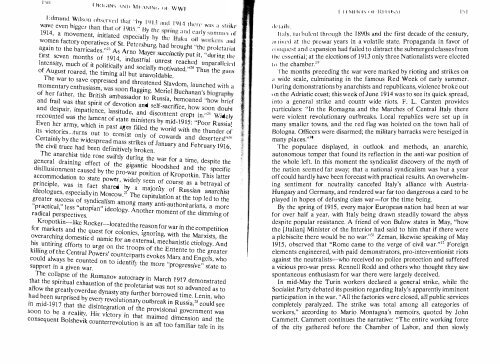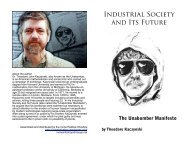CONTENTS - ouroboros ponderosa
CONTENTS - ouroboros ponderosa
CONTENTS - ouroboros ponderosa
You also want an ePaper? Increase the reach of your titles
YUMPU automatically turns print PDFs into web optimized ePapers that Google loves.
()I, II ;tN ... .-\NI' f\,I!·.\NINc i I II, W\tVI<br />
Edmund WilsoIl ohserved thaI "hy 1')1 " I I '<br />
wav ' b'<br />
e even 'gger than that of I9()') .: Il . , "<br />
1914, a movement initiat d<br />
women factory operatives of St P t. 'b<br />
again to the barricades,"" A A<br />
first seven months of 191:<br />
" 01 S ',"I'<br />
. , dill )1,1 thl'll' W'IS r "<br />
- ' . y Ihe spflng and early SUIJIIIIl'I of<br />
, e especIally hy the I:h k 'I '<br />
' II 01 wor'el'.s ;",,1<br />
e e, urg, had hrought "the proletariat<br />
rno<br />
ayer succmctly put it, "durin rhl'<br />
. . , In ustnal unrest reach 'd<br />
i I<br />
ntensIty , much of it politically and socia II m '<br />
,, unpara Ieit'd<br />
of August roared the timing all b t<br />
, U unaVOIdable<br />
The war to save oppressed and threate d S '<br />
d<br />
fl<br />
Y olIvated. Thus the gUll,<br />
momentary enthusiasm was soo n agging. Menel Buchanan's biooraphy<br />
of her father the 8 't . ' h<br />
, n IS am assador t R<br />
and frail was that spirit of devotion '<br />
and despair, impatience lassitud<br />
.<br />
b<br />
. ne lavdom, launched with a<br />
ussla, . emoaned "how brief<br />
. b<br />
a ; elf-sacnflce, how Soon douht<br />
recounted was the lame ; t o i' s e a s<br />
, , C( m<br />
tate<br />
b<br />
tent crept in."" Widely E<br />
ven her army which '<br />
its victories . . . trns ou;<br />
Certainly by th<br />
'd<br />
n<br />
t<br />
a<br />
. mlnlstcrs y mid 1915' "P R<br />
;i<br />
e WI espread mass stnkes of l'<br />
the civil truce had been definitivcly broken.<br />
,<br />
.<br />
- .<br />
b<br />
Oor USslar<br />
filled the world with the thunder of<br />
?nly of Cowards and desertersr"'"<br />
anuary and Fehruary 1916,<br />
The anarchIst tide rose swiftl Y d umg ' the war for a time, despite the<br />
general draining effect of th<br />
diSillusionment caused by th<br />
accommodation to state po ::ro- ar<br />
principle, was in fact share'<br />
Ideologues, especially in Moscow ,'yTh<br />
greater Success of syndicalism '<br />
e gIgantic . bloodshed and thc specific<br />
' e<br />
/ a<br />
n ot course as a betrayal of<br />
.<br />
r<br />
l<br />
pOSItIOn of Kropotkin. This latter<br />
. JO Ity of RUSSIan anarchist<br />
e capitulation at the top led to the<br />
" practical," less " utopian " ideo t mon l many an tr- a u thont arians, a more<br />
radical perspectives.<br />
Kropotkin-like Rocker-located the .<br />
for markets and the quest for colonies<br />
overarching domestic dynamic t<br />
ogy. nother moment of the dimming of<br />
.<br />
reason for war rn the competition<br />
. , Ignorrng, With the Marxists, the<br />
his untiring cfforts to urge 0 an external, mechanistic etiology. And<br />
killing of the Central Powers' o<br />
could always be Counted On to d: ;<br />
support in a given war.<br />
The collapse of the Romanov autocra in M<br />
that the spiritual exhaustion of the<br />
allow the greatly overdue dynasty a r<br />
had been surprised by eve revol<br />
in mid-1917 that the disi Z e rati <br />
Soon to be a reality H"<br />
g ,<br />
\ troops of the Entente to the greater<br />
rar<br />
evokes<br />
<br />
<br />
arx and Engels, who<br />
fy<br />
t e more progresSive" state to<br />
I CY'<br />
arch 1917 demonstrated<br />
<br />
u t<br />
na was not s <br />
advanced as to<br />
f y t er arrowed tIme. Lenin, who<br />
onaryoutbreak in Russia," could see<br />
of the provISional government was<br />
.<br />
, IS VictOry In that m" d d'<br />
consequent Bolshevik CQunterrevol f<br />
.<br />
alme rmensron and the<br />
u IOn IS an all too familiar tale in its<br />
.<br />
.<br />
dt' [;1 i Is.<br />
I I I , 1\,11 'N 1'0 (11' 1,1'1-" ":\ 1<br />
trOlly, lurhuknt thr()uh the l lNOs and the first decade of thc century,<br />
;ti l ivl'ti at the prewar years in a volatile state. Propaganda in favor of<br />
,', '''qucst and expansion had failed to distract the submerged classes from<br />
r he essential; at the elections of 1913 only three Nationalists were elected<br />
10 the chamber.29<br />
The months preceding thc war were marked by rioting and strikes on<br />
;t wide scale, culminating in the famous Red Week of early summcr.<br />
I )uring demonstrations by anarchists and republicans, violencc broke out<br />
,In the Adriatic coast; this week oflune 1914 was to see its quick spread,<br />
into a general strike and countrywide riots. F. L. Carsten providcs<br />
particulars: "In the Romagna and the Marches of Central Italy there<br />
were violent revolutionary outhreaks, Local republics were set up in<br />
many smaller towns, and the red flag was hoisted on the town hall of<br />
Bologna. Officcrs were disarmed; the military barracks were heseiged in<br />
many places,"30<br />
The populace displayed, in outlook. and methods, an anarchic,<br />
autonomous tempcr that found its reflection in the anti-war position of<br />
the whole lef!. In this moment the syndicalist discovery of the myth of<br />
the nation seemed far away; that a national syndicalism was hut a year<br />
off could hardly have becn forecast with practical results. An overwhelm<br />
ing sentiment for neutrality canceled Italy's alliance with Austria<br />
Hungary and Germany, and rendered war far too dangerous a card to be<br />
played in hopes of defusing class war-for the time being.<br />
By thc spring of 1915, every major European nation had been at war<br />
for over half a year, with Italy being drawn steadily toward the abyss<br />
dcspitc popular resistance. A friend of von Bulow states in May, "how<br />
the [Halian] Minister of the Interior had said to him that if there were<br />
a plebiscite there would be no war."" Zeman, likewise speaking of May<br />
1915, obscrved that "Romc carne to the verge of civil war."" Foreign<br />
elemcnts engineered, with paid demonstrators, pro-interventionist riots<br />
against the neutralists-who received no police protection and suffered<br />
a vici o us pro-war press. Rennell Rodd and others who thought they saw<br />
spontaneous enthusiasm for war there were largely deceived ,<br />
In mid-May the Turin workers declared a general strike, while the<br />
Socialist Party debated its position regarding Italy's apparently imminent<br />
participation in the war. "All the factories werc closed, all public services<br />
completely paralyzed. The strike was total among all categories of<br />
workers," according to Mario Montagna's memoirs, quoted by John<br />
Cammet!. Cammett continues the narrative: "The entire working force<br />
of the city gathered before the Chamber of Labor, and then slowly






